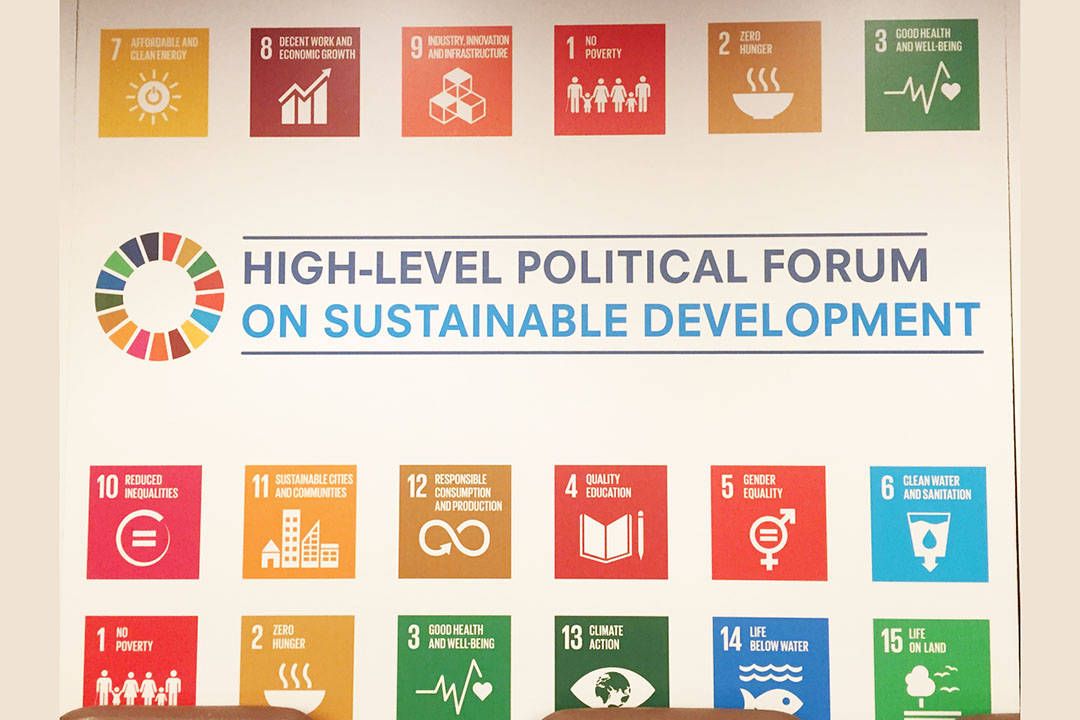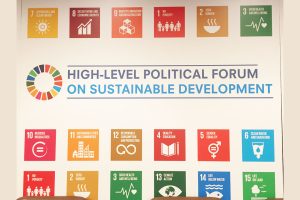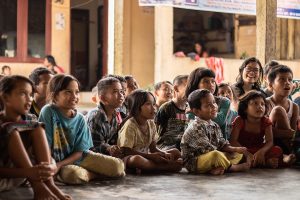The 2022 session of the High-level Political Forum on Sustainable Development (HLPF) concluded with the adoption of a Ministerial Declaration that strongly reaffirms commitment to the 2030 Agenda for Sustainable Development and its SDGs, “recognizing it as the blueprint for an inclusive, sustainable and resilient recovery from the COVID-19 pandemic and accelerating the decade of action and delivery for sustainable development, leaving no one behind.”
The Earth Negotiations Bulletin (ENB) summary report of the meeting highlights that the Forum convened “against the backdrop of an ongoing global pandemic, geopolitical tensions and open conflicts, and climate change” to review governments’ progress towards the SDGs and conduct in-depth review of SDGs 4 (quality education), 5 (gender equality), 14 (life below water), 15 (life on land), and 17 (partnerships for the Goals).
The ENB notes that “[a]s morning newspapers during the two-week meeting were filled with stories about the Russian war in Ukraine, roll-backs in women’s rights, unprecedented heat waves, and the fall of three governments, delegates were called on to prioritize action to:
- invest in equitable vaccine access, including through license sharing to allow countries to produce vaccines and other medically important products;
- tackle the food, energy and fertilizer crises, which have emerged from the war in Ukraine;
- increase investments in social and health protections, especially for women;
- increase meaningful youth participation in decision making;
- invest in people, including through the Transforming Education Summit;
- “keep 1.5°C alive,” including by ending the addiction to fossil fuels and investing in renewable energy; and
- review access and eligibility for concessional finance for developing countries.”
The integrated, indivisible, and interlinked nature of the Goals, and the consideration of the impacts of the COVID-19 pandemic and building back better in that light, was “an important underlying theme throughout the meeting.” Discussions also focused on the needs of developing countries, including the Multidimensional Vulnerability Index (MVI) as “a form of measurement that truly recognizes ecological and economic vulnerability.” The MVI, the ENB analysis suggests, could serve as an alternative to gross national income (GNI) “when assessing eligibility for concessional financing.” Its proponents argue that MVI provides “a more nuanced picture” of small island developing States’ (SIDS) development, including their vulnerability to repeated external shocks, and that as such, it could ensure much-needed support by facilitating “a differentiated approach to development financing.”
During this year’s HLPF, 44 countries presented their voluntary national reviews (VNRs), sharing experiences, successes, challenges, and lessons learned. These countries are Andorra, Argentina, Belarus, Botswana, Cameroon, Côte d’Ivoire, Djibouti, Dominica, El Salvador, Equatorial Guinea, Eritrea, Eswatini, Ethiopia, Gabon, the Gambia, Ghana, Greece, Grenada, Guinea-Bissau, Italy, Jamaica, Jordan, Kazakhstan, Latvia, Lesotho, Liberia, Luxembourg, Malawi, Mali, Montenegro, the Netherlands, Pakistan, the Philippines, São Tomé and Príncipe, Senegal, Somalia, Sri Lanka, the Sudan, Suriname, Switzerland, Togo, Tuvalu, the United Arab Emirates (UAE), and Uruguay.
The ENB highlights that HLPF 2022 began planning for the second “SDG Summit,” to be convened in September 2023, and that “Member States were challenged to be ‘disruptive’ in their planning for the session and to embrace the opportunity this Summit may present for getting back on track.” The SDG Summit meets every four years at the highest level.
On the last day of the HLPF, delegates adopted a 142-paragraph Ministerial Declaration that Member States had negotiated over a period of six months. The ENB reports that one paragraph was subject to a vote, due to disagreements over language related to “the full realization of the right to self-determination of peoples living under colonial and foreign occupation.”
The 2022 HLPF Ministerial Declaration reaffirms: that “eradicating poverty in all its forms and dimensions, including extreme poverty, is the greatest global challenge”; the “importance of achieving global food security”; and that “there can be no sustainable development without peace and no peace without sustainable development.” It contains dedicated sections on the impact of COVID-19 on the 2030 Agenda and actions to recover better while accelerating progress towards the SDGs, Goals under in-depth review and VNRs, “other priority issues,” and “our road map for the way forward.”
HLPF 2022 convened under the auspices of the UN Economic and Social Council (ECOSOC) from 5-7 and from 11-15 July at UN Headquarters in New York, US. Several hundred side events, special events, VNR Labs, and exhibitions took place in person and online. The HLPF was attended by six Heads of State and Government, more than 130 deputy prime-ministers, ministers, and vice-ministers, as well as other representatives from governments, intergovernmental organizations, and civil society. [Earth Negotiations Bulletin Coverage of HLPF 2022]



